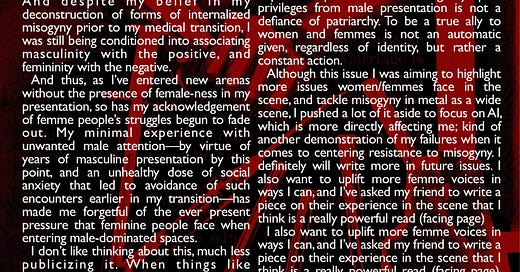AN INTERNAL RECKONING
On internalized misogyny as a masculine-presenting person, and how queerness does not equate to being free from patriarchy
NPZ #3 — JANUARY 2025 — PAGE 9
(The first half of this is from a vent piece I wrote while riding the train to the Exodus show back December 6th, while having a minor identity crisis)
I believed I got over my internalized misogyny phase. The “your mom” jokes, the all-male artist playlists, and the consumption of mostly male-centric media. I attributed my belief of some sort of cure to internalized misogyny through female friendships, listening to female pop singers, adoration of drag queens and the occasional feminine content creator. But my favorite tastes of consumption still lean male, masculine voices, masculine perspectives, macho and dominating.
As my body and lived experience strayed further from the “woman’s” one, I feel like I’ve had a double edged growth. Joy, on the one hand, to be alleviated of the traits that were the sources of deep emotional trauma and discomfort. As I walked down night streets alone with only a surface level touch of caution, I felt a sort of gratification in my “successfulness” of achieving male privilege. And as my distance from perceived femininity grew, so did my happiness and self-content with my gender identity and presentation grow. And despite my belief in my deconstruction of forms of internalized misogyny prior to my medical transition, I was still being conditioned into associating masculinity with the positive, and femininity with the negative.
And thus, as I’ve entered new arenas without the presence of female-ness in my presentation, so has my acknowledgement of femme people’s struggles begun to fade out. My minimal experience with unwanted male attention—by virtue of years of masculine presentation by this point, and an unhealthy dose of social anxiety that led to avoidance of such encounters earlier in my transition—has made me forgetful of the ever present pressure that feminine people face when entering male-dominated spaces.
I don’t like thinking about this, much less publicizing it. When things like chromosomes, internal organs, and bodily forms are out-of-sight, so too can they be out-of-mind.
I don’t want to jeopardize my privilege of safety in male spaces by exposing my status. But I also recognize the significance of being open and upfront, to challenge others to dare treat us with any less respect.
To be a man is a social construct, as is gender as a whole. And the trans experience is often one that is double-edged, resisting the gender binary, yet at the same time reinforcing and leaning into its confinements in order to achieve gender euphoria. All this as a fancy way to say that I’m still far from being truly free from internalized misogyny, especially as the male experience is still so intrinsically tied to diminishing femininity.
I’ve caught myself being more scrutinous of women/feminine-presenting people in the metal scene than the men. Cautious to strike up conversation for fear that the person—or more often, the girl—with the Metallica shirt isn’t a “real fan”. Is this not exactly the type of casual misogyny that is rife within the scene? Anti-poser culture is one thing, but to disproportionally assume only women are “fake fans” is the kind of sub-conscious misogyny that has deep roots in metal culture. Comments about “groupies” and diminishing women at shows as only objects of desire or only attachments to a male counter-part is similarly misogynistic.
Just because I am acknowledging these misogynistic thoughts does not mean the works stops there. Despite my lived experience prior to transitioning, my quiet privileges from male presentation is not a defiance of patriarchy. To be a true ally to women and femmes is not an automatic given, regardless of identity, but rather a constant action.
Although this issue I was aiming to highlight more issues women/femmes face in the scene, and tackle misogyny in metal as a wide scene, I pushed a lot of it aside to focus on AI, which is more directly affecting me; kind of another demonstration of my failures when it comes to centering resistance to misogyny. I definitely will write more in future issues. I also want to uplift more femme voices in ways I can, and I’ve asked my friend to write a piece on their experience in the scene that I think is a really powerful read (facing page)
I also want to uplift more femme voices in ways I can, and I’ve asked my friend to write a piece on their experience in the scene that I think is a really powerful read (facing page), and a few other perspectives regarding toxic masculinity, gender presentation, and gatekeeping in metal (pgs. 11-12)





